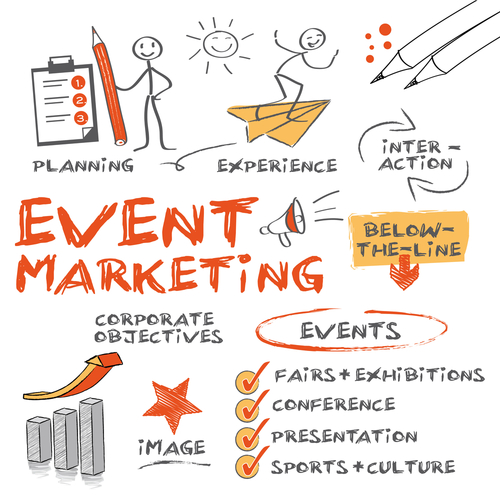Event marketing is an innovative approach to brand promotion that brings products and services to life through experiences. While event management focuses on the logistical aspects of organizing an event, event marketing aims to build brand affinity and forge lasting memories through direct interaction. In this engaging and comprehensive blog post, we’ll peel back the layers of event marketing and uncover why emotional engagement is the cornerstone of its success. We’ll also dive deep into strategies, objectives, and how technology is shaping the future of event marketing efforts.
So, whether you’re a business owner, marketer, or event enthusiast, stick around to gain valuable insights on how to craft, execute, and measure event marketing campaigns that resonate with your audience.
Event Marketing Fundamentals
Definition and Overview
At its core, event marketing involves promoting a brand, product, or service through live events, ranging from exclusive gatherings to large-scale conferences. It transcends traditional advertising by focusing on creating interactive experiences that leave a lasting impression. This immersive approach closely relates to experiential marketing, which emphasizes allowing consumers to “experience” a brand firsthand, fostering a deeper level of emotional connection. Unlike event management’s organizational perspective, event marketing zooms in on engaging the audience before, during, and after the event to drive brand objectives.

Source: Kaltura
Emotional Engagement and Memory
Effective event marketing hinges on the ability to form emotional bonds with attendees. It takes advantage of the fact that humans are more likely to remember experiences that evoke strong emotions, hence the effectiveness of such campaigns in establishing a durable brand presence in consumers’ minds. The psychological underpinnings of this technique reveal that the sensory stimulation and personal interactions at events help solidify memories associated with a brand.
Event Marketing Objectives
Why does a company engage in event marketing? Objectives can range from generating leads to enhancing customer loyalty, increasing brand awareness, or launching new products. It’s crucial to align event marketing goals with overall brand strategy, ensuring every activity delivers tangible value not only to the company but also to the audience and other stakeholders.
Event Marketing Strategy Development
Crafting the Event Marketing Plan
When developing a marketing strategy for an event, it’s essential to start with a clear understanding of the brand’s identity, audience demographics, and what makes the event unique. The strategy should involve meticulous planning, execution, and post-event analysis. This ensures that every touchpoint — from promotional material to on-site experiences and follow-up communications — resonates with the target audience and supports the brand narrative.
Understanding Attendee Motivations
Knowing why someone chooses to attend an event is critical. Attendees may seek education, networking, entertainment, or inspiration. By tapping into these desires, marketers can tailor their messaging to better attract and engage their audience.
Stakeholder-Focused Marketing
Event marketing also demands attention to the needs of sponsors, partners, and exhibitors. It’s a balancing act of stakeholder goals with attendee expectations, which can make or break the success of an event.
The Event Elevator Pitch
In a few concise sentences, an elevator pitch should capture the essence of the event and hook various stakeholder personas. It’s the crystallized version of what attendees can expect, aimed at piquing interest and driving participation.
Advanced Event Marketing Techniques
Growth Hacking Tactics for Events
Applying growth hacking to event marketing involves data-driven, agile methodologies that rapidly spread event awareness and boost engagement. It’s about choosing the right digital tools such as social media platforms, SEO, and content marketing to achieve scalable results swiftly.
Co-Creation with the Audience
Inviting attendees to shape the event content and experiences encourages greater investment in the outcome and elevates the overall quality of interaction, leading to higher satisfaction and stronger loyalty.
Live Streaming and Its Impact
By extending the event to a virtual audience through live streaming, marketers can significantly increase their reach and engage participants who are unable to attend in person.
Multichannel Marketing Journeys
A well-rounded event marketing campaign will utilize multiple channels — social media, email, web, and even direct mail — to engage potential attendees multiple times, nudging them closer to conversion with each interaction. Remember, it’s about being where your audience is, and sometimes combining different strategies, such as social media and content marketing, can amplify your message.
Embracing Technology and Analytics
Event marketers can leverage event technology like QR codes, RFID-enabled wristbands, and mobile event apps to collect valuable attendee data, analyze engagement, and fine-tune efforts. This backend insight often dictates the strategic direction of marketing and sponsorship opportunities.
Content Curation and Influencer Engagement
Cultivating a repository of relevant content and engaging with influencers who can act as brand ambassadors positions the event at the center of community conversations. It’s about fostering an ecosystem where attendees both consume and contribute content.
Referral Programs and Social Sharing
Encouraging attendees to share their plans to attend the event or refer others can snowball into significant word-of-mouth promotion. These tactics effectively turn your audience into an extension of your marketing team.
In-Depth Content Marketing
Diving deep into topics related to the event subject matter through well-researched and authoritative content can help attract a specialized audience and establish the brand’s thought leadership in the space.
Implementing Successful Event Marketing Campaigns
Remarketing and Audience Re-engagement
Continuing the dialog with event attendees after their initial interaction, using targeted display ads and social media campaigns, keeps the brand top-of-mind and can convert interest into commitment.
Pop-ins and Exit Intent Technology
Strategically placed website pop-ins and exit intent technology capture leads at critical moments, providing another opportunity to convert web traffic into event attendees.
Video Content as a Marketing Tool
There’s nothing quite like video to generate buzz around an event. Sizzle reels, interviews, and testimonials can spark excitement and convey the event’s value proposition in a dynamic format.
Social Media Strategy and Platform Choices
A robust social media strategy will consider the unique communities on different platforms and adapt content accordingly. For example, LinkedIn campaigns might focus on the professional benefits of attending, while Instagram could highlight the experiential aspects of the event.
Adopting New Event Marketing Technologies
With a finger on the pulse of emerging technologies, event marketers can provide captivating experiences that appeal to tech-savvy attendees and show that the brand is on the cutting edge.
Personalizing the Attendee Journey
Customizing interactions based on attendee preferences and behavior ensures that every touchpoint aligns with individual expectations and enhances their overall experience, from discovery through to post-event engagement.
Future-Proofing Event Marketing Efforts
The Role of Artificial Intelligence and Machine Learning
AI and machine learning have immense potential to reshape event marketing, allowing for predictive analytics that drive more personalized and effective campaigns.
Integrating Sustainability into Event Marketing
Sustainable practices in event marketing are becoming a significant draw for ecologically conscious attendees and are essential for a brand’s public image and values.
Virtual and Hybrid Event Innovations
Post-pandemic, the event landscape has shifted dramatically towards virtual and hybrid formats. These innovative approaches require a blend of traditional event marketing savvy and new tech adeptness to engage remote participants fully.
Measuring and Analyzing Event Marketing ROI
It’s vital to set and track metrics that spell success for event marketing campaigns. Analytical tools can parse through data gathered at various stages of the event lifecycle to inform decisions and improve future outcomes.
Conclusion
Event marketing goes beyond mere promotion; it forges connections through memorable experiences that align with a brand’s essence. As we peer into the future, the effective use of technology, an understanding of psychology, and a commitment to sustainability will be the hallmarks of successful event marketing strategies. We’ve stepped through the importance of emotional engagement, strategic planning, innovative techniques, and evaluation — all integral to carving out a distinct space for a brand in a crowded marketplace.
By staying adaptable, embracing new technologies, and always aiming to exceed attendee expectations, event marketers can continue to craft campaigns that resonate and have a lasting impact. Maintaining a thirst for knowledge and an understanding of ever-changing consumer behaviors will ensure your event marketing strategy remains relevant and effective. In short, to excel at event marketing is to understand the emotions behind the experience and the technology that facilitates it, all while keeping a meticulous eye on your data and metrics.

